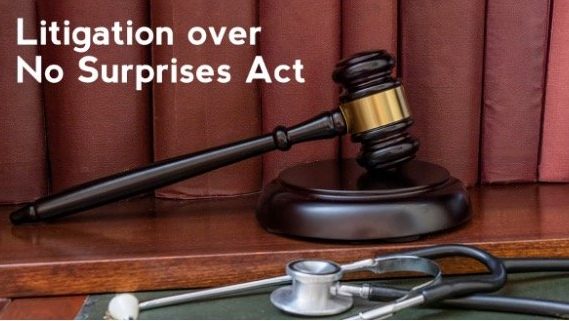While you were celebrating the No Surprises Act designed to protect patients from surprise medical bills by removing them from payment disputes between health insurers and out-of-network providers, four federal agencies were busy concocting a big surprise of their own—the September Rule.
Critics say it bears little resemblance to the law that Congress passed and the independent dispute resolution (IDR) process that it created.
In a nutshell, the statute restricts out-of-network providers’ ability to charge patients what they would have been charged if they had been treated by in-network providers. Equally as important, it does not expect providers to absorb underpayments. The September Rule is an interim final rule that became effective without public notice or comment October 7, 2021, more than nine months after the statute became law.
The American Medical Association, American Hospital Association, and providers in Massachusetts, Nevada, and North Carolina have filed suit against the federal agencies that promulgated the new rule—the Department of Health and Human Services, Department of Labor, Department of the Treasury, and Office of Personnel Management (collectively the Departments).
The plaintiffs argue that the rule contradicts the intent of the new law by directing independent arbitrators who settle disputes between providers and insurers unable to negotiate an agreement to tip the scales by presuming that one factor, the Qualifying Payment Amount (QPA), reflects the appropriate payment rate instead of the factors specified in the statute. The plaintiffs seek a stay pending judicial review of the September Rule provisions that require a QPA presumption, or alternatively, summary judgment in the plaintiffs’ favor.
The factors specified in the statute, include, in addition to QPA, the level of training, experience, and outcomes measurements; geographic market share; patient acuity and the complexity of providing the service; teaching status, case mix, and scope of services; good faith efforts, or the lack thereof, to enter into network agreements and contracted plan rates; any information the arbitrator requested; and additional information submitted by either party.
Congress mandated that arbitrators consider all factors and left it to their discretion and expertise to decide how much weight to give each factor in any given case. It also required arbitrators who consider the parties’ best and final offers during the IDR process to have sufficient, medical, legal, and other expertise, but it notably did not assign a particular weight to any of the factors that must be considered.
Congress further specified three facts that arbitrators shall not consider—usual and customary charges, the amount a provider would have billed if the statute’s billing provisions were inapplicable, and the amount a public payer, such as Medicare, would pay.
Plaintiffs argue that patients, especially in low-income and rural communities, will suffer irreparable harm because the QPA presumption will have a devastating effect on nonprofit hospitals that offer a range of vital healthcare services that already operate at a loss. They further argue that providers will suffer irreparable harm because the QPA presumption will prevent fair and adequate compensation and the inability to recover underpayments by suing for damages.
Plaintiffs posit that in-network providers are at similar risk of harm as insurers demand payment rate reductions to match payments they expect to receive through the IDR process and threaten contract cancellation when providers don’t agree. One insurer recently demanded a significant reduction in a provider’s contracted rate based on what it described as the “clarity” in the September Rule.
Although the September Rule was already in effect, the Departments invited public comments through December 6, 2021. They did not commit to a date by which they would issue a final rule, but revisions are not anticipated.
The plaintiffs argue that while there is more than sufficient time to publish updated final rules that conform to the statute before the initial arbitration decisions that are expected in March 2022 the public interest weighs heavily in favor of a stay.

